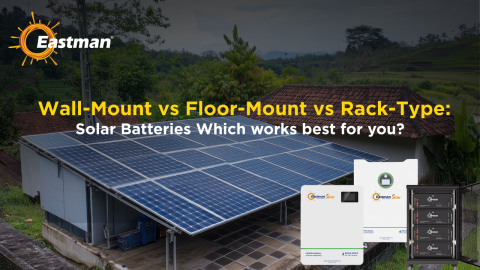
Home Battery System - A Compact Guide
I. Introduction
Are you tired of being left in the dark during power outages? Do you cringe at the sight of your soaring utility bills? The Home Battery System is not just a technological marvel; it's a game-changer, revolutionizing the way we interact with and consume energy.
Home Battery Systems encompass cutting-edge storage solutions designed to capture, store, and manage electricity within domestic environments. Their primary goal? To offer a reservoir for surplus energy generated from various sources like solar panels or off-peak grid electricity. These battery systems emerge as the catalysts for energy independence, revolutionizing the way households interact with and consume energy.
Let us look into the unparalleled advantages that make these systems an indispensable addition to your home.
II. Advantages of Home Battery Systems
1. Off-grid capabilities: Ensuring power during outages
Imagine a stormy night, the thunder roars, and suddenly, the power goes out. While your neighbors scramble to find candles, your home remains a beacon of light. Home Battery Systems grant you the power of independence. With their off-grid capabilities, you're no longer at the mercy of unpredictable power grids.
The system kicks in seamlessly, ensuring a continuous power supply even when the external world is plunged into darkness. It's not just a backup; it's a lifeline that keeps your home running smoothly, irrespective of external disruptions.
2. Cost savings through peak shaving and energy arbitrage
Through sophisticated techniques like peak shaving and energy arbitrage, these systems optimize your energy usage to maximize cost savings. Peak shaving involves using stored energy during peak demand hours when electricity costs are at their highest, effectively "shaving" off those expensive peaks from your utility bills. Energy arbitrage, on the other hand, involves buying low-cost electricity during off-peak hours and using it during high-demand periods.
3. Facilitating integration of renewable energy sources
The solar panels soak all the energy in, converting photons into electricity. But what happens when the sun sets? Home Battery Systems are the perfect partner for renewable energy integration. They act as your personal energy reservoirs, storing surplus solar energy generated during the day.
When dusk descends or clouds loom overhead, these stored reserves kick in. It ensures a seamless transition to continued sustainable energy consumption. It's not just about harnessing renewable energy; it's about maximizing its potential day and night.
4. Minimizing reliance on the grid and reducing utility bills
Inverter battery systems optimize power usage. This is done by prioritizing electricity from solar panels or the grid and utilizing stored battery power during peak hours or during power outages. This way, households or businesses can reduce their dependency on the grid, leading to decreased utility bills over time. It's a win-win scenario where you contribute to a more stable energy grid while enjoying the financial benefits of a streamlined and efficient home energy system.
III. Environmental Impact of Solar On-Grid System
A. Reduced Carbon Footprint and Environmental Benefits
After maximizing the efficiency of energy usage, these battery systems significantly reduce reliance on fossil fuel-based electricity. This decrease in dependency directly translates to a reduced carbon footprint.
Moreover, Home Battery Systems ensure that clean, sustainable energy is not wasted but instead utilized optimally. The result? A vast reduction in greenhouse gas emissions and a significant step towards a cleaner, healthier planet.
B. Contribution to Sustainable Living and Clean Energy Adoption
Embracing a Home Battery System isn't just a personal choice; it's a statement in support of sustainable living. These systems empower individuals to actively participate in the renewable energy movement. After seamlessly integrating with solar or wind power setups, they encourage the adoption of clean energy practices on a residential scale. This adoption is not just about technology; it's about fostering a mindset.
IV. Technological Features
A. Overview of key features and functionalities
1. Smart Energy Management: These systems are equipped with intelligent algorithms that optimize energy usage based on demand, ensuring efficient utilization, and reducing wastage.
2. User-Friendly Interfaces: Most systems come with intuitive interfaces, allowing homeowners to easily monitor energy levels and make clear decisions about their energy consumption.
3. Real-Time Monitoring: Keep a finger on the pulse of your energy usage with real-time monitoring. Detailed insights enable better control and planning for your power needs.
4. Integration with Smart Home Systems: Seamlessly integrate with your smart home ecosystem. This enables automation and synchronization with other devices, optimizing energy consumption further.
B. Why look for battery capacity and performance?
1. Battery Capacity: It refers to the amount of energy a system can store. Assess your household's complete energy needs to determine the optimal capacity required. Systems come in various capacities to suit different requirements.
2. Scalability: Home Battery Systems are designed to be scalable, allowing for expansion or downsizing as needed. It ensures that your battery system can adapt to changes in your energy consumption patterns over time.
3. Performance Metrics: Factors like charge-discharge cycles and lifespan contribute to the overall performance of the system. Understanding these metrics helps in selecting a system that aligns with your long-term energy goals.
V. Future Trends and Considerations
The landscape of Home Battery Systems is a canvas of constant innovation, shaping the future of residential energy solutions. Understanding emerging trends and crucial considerations can be the key to unlocking the full potential of these systems.
A. Emerging trends in home battery technology
1. Advancements in Energy Density: Keep an eye on the horizon for batteries with higher energy density, enabling more storage in compact designs. This trend will revolutionize the storage capacity of Home Battery Systems.
2. Enhanced Longevity: Future batteries are anticipated to boast improved lifespan, minimizing the need for frequent replacements, and ensuring sustained efficiency over longer periods.
3. Integrative Smart Technology: Expect Home Battery Systems to evolve further into intelligent energy hubs. It will lead to seamlessly integrating with AI-driven smart home systems for optimized energy utilization.
4. Eco-Friendly Solutions: The future holds promise of eco-conscious materials and manufacturing processes. It will align Home Battery Systems with the pursuit of sustainability.
B. Factors to consider when selecting and installing home battery systems:
1. Compatibility and Integration: Ensure compatibility with existing renewable energy sources. Opt for systems that integrate effortlessly into your home's infrastructure.
2. Scalability and Expansion: Consider future energy needs. Choose systems that allow for scalability, enabling easy expansion or adjustments as your household's energy consumption patterns change.
3. Installation and Maintenance: Evaluate installation requirements and ongoing maintenance. Seek professional guidance for installation and choose systems with manageable maintenance needs to ensure longevity.
4. Warranty and Support: Look for robust warranties and reliable customer support from manufacturers. It is essential to have assistance available in case of any technical issues.
Future of home inverter battery systems
[1] Enhanced Energy Storage: We can anticipate significant advancements in battery technology. This will lead to higher energy densities and improved storage capacity for longer backup periods.
[2] AI-Powered Energy Management: Expect the integration of artificial intelligence (AI) in inverter batteries. This will enable better energy management. It will also help optimize power usage based on consumption patterns and utility rates.
[3] Grid-Interactive and Off-Grid Capabilities: Inverter battery systems will evolve to seamlessly switch between grid-connected and off-grid modes. This advantage will provide greater flexibility and reliability.
Parting notes
The significance of Home Battery Systems extends far beyond the boundaries of individual homes. They represent a collective step towards a more sustainable, decentralized energy ecosystem. After reducing reliance on conventional grids and integrating renewable sources, users actively contribute to a cleaner, more efficient energy landscape.
So, embrace the autonomy and relish the cost savings. Your decision to adopt a Home Battery System is not just about upgrading your home; it is about being an integral part of a global movement towards a brighter, more sustainable tomorrow. The time to empower your home and contribute to a greener world is now.






